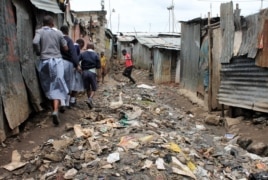 Children study at a private non-formal school, one of about 120 in the in Mathare slum, in Nairobi, Kenya, June 2, 2015. (Hilary Heuler / VOA)
Children study at a private non-formal school, one of about 120 in the in Mathare slum, in Nairobi, Kenya, June 2, 2015. (Hilary Heuler / VOA)NAIROBI, KENYA
The walls are made of rusty corrugated metal, the roof lets in the rain and the muddy alley outside is strewn with trash. The 20 or so children packed into the small room, however, do not seem to mind, as they are focused on learning English.
Although this non-formal school blends in with its physical surroundings here in Mathare, a Nairobi slum of about a half-million people, it is utterly unique from the four public schools historically responsible for educating all potential students in the community. And even for those who do gain admission to those preciously few public schools, says head teacher Richards Olare, the education is poor.
“They don’t have enough rooms, and then even the teacher-pupil ratio is actually very imbalanced,” said Olare. “Having more than 100 children in a class makes it so hard for a teacher to have close relationships with the kids.”
Providing education
Olare’s school is not free – children pay around $5 a month to attend. But the slum has around 120 non-formal schools like his. They serve an important role, he said, stepping in to teach the thousands of children who otherwise would not be in school at all.
“We teach, we use the same syllabus, the same curriculum, but we are non-formal in the physical structures,” Olare said. “Otherwise we do exactly what is done in the public schools.”
Such for-profit schools came to attention recently when the International Finance Corporation, which is part of the World Bank group, invested $10 million in Bridge International Academies, a multinational chain of low-fee private schools. Bridge also is backed by Microsoft founder Bill Gates and Facebook creator Mark Zuckerberg.
Bridge says its for-profit model not only provides an opportunity for children who otherwise would be left out of school, but also gets better results. Such schools complement the public system, the company says, and it hopes to eventually be considered for public funding itself.
But Sylvia Mbataru of Hakijamii, one of a group of civil society organizations critical of Bridge, is bothered by the idea of a separate schooling system for the poor. She said this funding should instead go into making sure everyone can be educated at the same schools, for free.
“They have all this money to go and invest in a private education system where kids and poor parents are forced to dig in their pockets to access education. Why is it that this money cannot be channeled to governments and support them to make education freely accessible to everyone?” she asked.
If you are living in the slums, Mbataru said, even a few dollars a month can be a lot of money.Janet Awor spends her days selling fried chapatis on the roadside in Mathare. She has four children in school.
“Me, I am working outside there. I am working very hard to get that money. I’m struggling for school fees, rent, food,” said Awor.
School fees
Nearly all her income goes into school fees, she said, and she often has to borrow money for food.
But two of Awor’s children are in a public school, and despite a 2003 law making primary education free, she said she has to pay for that, too.
Community organizer Bernard Ochieng said that in Mathare, public schools often charge even higher fees than private ones.
“Government are saying the school is free, but in the real sense school is not free. School is free in the TV or in the media, but when you go in the school, you will realize that there is no free education there,” said Ochieng.
As long as the government fails to educate all Kenyan children for free, private schools will continue to exist, said Ochieng. But whether the World Bank should be pouring money into them, he added, is another matter entirely.



